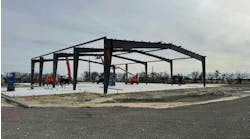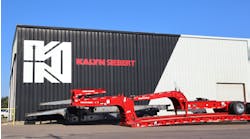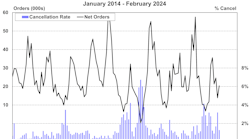Weak freight rates continue to reduce carriers’ willingness to invest in equipment, suggested ACT Research in the latest issue of the State of the Industry: U.S. Trailers report. February trailer net orders, at 20,500 units, were nearly 21% lower year-over-year but climbed 6,600 units above January’s intake.
“Seasonally adjusted, February’s orders fell to 20,100 units compared to a 12,600 seasonally adjusted rate in January,” said Jennifer McNealy, director–CV market research and publications at ACT Research. “On that basis, orders increased 59% m/m. Dry van orders contracted 18% y/y, with reefers and flats both down 31% compared to February 2023.”
On the other hand, total cancellations “took a turn for the better,” in February, dropping to 1.3% of the backlog from January’s elevated 3.2% rate, McNealy noted. Several markets remained above the 1% mark, with OEMs indicating cancellations from both fleets and dealers.
“Clearly, no one needs a higher trailer-to-tractor ratio or extra stock on the showroom floor in a market swimming in capacity,” she said. “The good news is that healthy economic performance is increasingly favoring freight-generating economic sectors. However, capex remains limited at the start of 2024, and with impending expensive EPA regulations for power units, fleets are forced to make difficult decisions about how they spend their money, weighing on trailer demand.”
ACT Research’s State of the Industry: U.S. Trailers report provides a monthly review of the current US trailer market statistics, as well as trailer OEM build plans and market indicators divided by all major trailer types, including backlogs, build, inventory, new orders, cancellations, net orders, and factory shipments.










